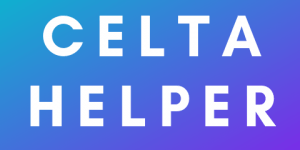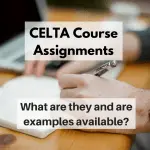Hi there! In this post, let’s go through the ‘Focus on the Learner’ CELTA Assignment.
I’ve had many questions about this, from people who are preparing for their CELTA or for those who are battling their way through the first few weeks. Fear not – help is at hand!
First, here’s a brief outline of what we’ll talk about in this post.
In short, the post will cover each of the following key points in detail:
- the different types of ‘Focus on the Learner’ assignment, because different centers may do it differently
- what you need to include to get a good grade
- the different parts of the assignment
- other things you can prepare in advance to help you succeed
- examples of this assignment available for free online (and why should be careful using them)
Let’s get started!
Before We Begin: Quick Background Point
Some CELTA centres offer this as CELTA assignment 1, but others do it at a different point in the course.
It depends, but this assignment is usually set early on in the course, but the deadline can vary – I have heard of students being given this as CELTA assignment 1, but told to submit it after CELTA assignment 2 and 3, for example!
With this assignment coming so early on the CELTA, it can cause people problems since the assignment requires some careful thought about logistics an planning.
It is essential to be prepared and organised for your Focus on the Learner assignment, not least because this comes while you are still getting used to the whole course and how it works.
This can catch people out, but it doesn’t need to if you are prepared!
Obviously, if you’re reading up on things like this on websites that should help you and you should remove that element of stress from your CELTA experience.
[convertkit form=5012078]
Different Types of Focus on the Learner Assignment
Let’s start by looking at the 3 types of ‘Focus on the Learner’ assignment.
These are the ones that I know about; as I’ve said before, I’m not a CELTA trainer, but I have done the course and I speak to people about CELTA regularly.
The main three types of Focus on the Learner CELTA assignment are:
- Type 1 – to focus on an individual learner
- Type 2 – to look at a pair of learners, where you can compare and contrast them
- Typ3 – to focus on a group of learners or entire class
So, you’ve got 3 distinct approaches to this particular CELTA assignment. Let’s have a look at some points for each below.
Assignment Type 1 and 2: Focusing on an Individual or Pair of Learners
For the versions this assignment which focus on an individual or pair of learners, CELTA trainees will usually have to perform an interview with one (or two) learners.
Therefore, you will need to think about things like:
-
The right questions to ask the student/learner
-
How to record the interview
-
Getting the student’s permission, and making sure they understand what they are signing up for (think about this for low-level students – harder than it sounds)
-
Arranging a time and a place to conduct an interview
-
Choosing a student who you think will actually turn up
Also, think about what the student will get out of coming to meet you for an interview in their free time. If there is something in it for them, they are more likely to come and meet you outside of class.
You need to make the student(s) aware that doing the assignment is helping you on your CELTA course, but you also need to show them the benefits of coming for an interview, because if they don’t see any benefit, they’re unlikely to come (bad news for your assignment!).
Something you can do here is to offer them extra input into their learning as part of your interview, so you need to think of it from that perspective.
For example, you could offer some pronunciation advice based on what they say in the interview, or give them photocopies of some relevant worksheets based on what you’ve heard.
Interview Questions for Your CELTA Assignment
If you have to interview two learners, it’s going to be slightly different from just working with one, so think carefully about how you will ask the questions and whether it is best to have them there together or at different times. Your CELTA trainers can likely tell you which they recommend here.
Try to keep interview questions open-ended and avoid asking questions which have just a Yes/No answer.
For example, it would be better to ask ‘Why do you like English?‘ to a low-level student than to ask ‘Do you like English?‘.
Yes, they could understand both of the above questions, but consider which one is likely to allow the student to talk the most.
After all, you will need them to speak so that you can analyse their language!
This document from ISE Hove*, a CELTA centre in the south of England, is very useful as it provides both a letter template to invite a student to an interview and a list of possible questions you can use when interviewing a student. Very handy!

*I don’t work for ISE Hove and have no contacts there – it’s just a great document!*
My Experience of the Focus on the Learner Assignment
I should add that I had to do the individual learner for mine, and I interviewed a student from Eritrea. His native language was Tigrinya, which I’d never heard of before!
I’d studied Spanish and French for my undergraduate degree but nothing close to an East African language!
I didn’t know anything about Tigrinya, and there wasn’t really much online about it, bearing in mind that this was in 2007, so there were even fewer websites, so it was really quite hard to find information. However, I did find some in books in the end and these helped me to get through.
Actually, thinking about it, that was one time where it was really helpful to do my CELTA course at a university – the library had so many books available (as you would expect) and the online journal articles we had access to were very useful – but that’s for another article!
See here for more on recommended CELTA course books, or keep reading this article for the section on my recommended books for the Focus on the Learner Assignment!
Choosing the Right Students for Your CELTA Assignment – Types 1 & 2
Another point to note is that, if you are on a CELTA course with students speaking many different languages, the tutors will specifically say that you cannot interview an individual, or a pair of learners, who speak any of the same languages as you.
Now, although this might sound a bit unfair, the tutors want you to work out of your comfort zone.
They want you to show that you know something, or are able to learn, about different languages, as well as just your own, because it’s very easy if you’re on a CELTA course as a non-native speaker, to talk about your own language or if you’re a native speaker to talk about a language you’ve learned.
Try to take this as a challenge and an opportunity to learn new things and broaden your horizons. I remember doing a case study on a Japanese learner as part of a TESOL module I did at university.
The idea that a basic Japanese sentence is Subject + Object + Verb, rather than Subject + Verb + Object like English blew me away. For more on Japanese, check it this detailed post I’ve just found on Japanese sentence structure (looks interesting!)
|
English | Japanese |
|
Subject + Verb + Object |
Subject + Object + Verb |
| I talked to him |
I to him talked |
Having to learn about a completely new language may seem a bit scary but it is good training for your future career as an English teacher, and a great way to learn new things about languages around the world.
However, not everyone will have to do this as it is not always logistically possible.
For example, if you consider an Arabic speaker on a CELTA course in an Arabic-speaking country, with a CELTA course where all the students speak that same language, then it’s highly likely that CELTA trainees there will focus only on students who speak the Arabic language.
That is not a guarantee that you will be able to focus on a language you know, but studying the CELTA in certain countries can increase the chances of this.
Type 3 – Focus on the Learners: Using a Whole Group or Class
Moving on to the final type of assignment, using a whole group or class, which could involve the whole class of students who you will be teaching in your assessed teaching practice sessions.
It depends how big the group is, but you will have to do a profile of the group in terms of where they’re from and their language backgrounds.
Key points to consider when writing a group profile include the following:
-
Do they all speak the same first language?
-
Are they from many different countries?
-
Do they have similar reasons for learning?
-
Is there a mix of ages?
There are all kinds of dynamics that you can pick up on here, largely based on demographic information, which give insight into the students’ learning.

Focus on the Learner: Word Count and Key Points
In terms of what you need to include, here are the main points:
-
Generally, the first 300 to 350 words should be about learner(s) background.
-
Then, the next 300 to 350 would be an analysis of the student’s language problems
-
This will then be followed by another 300-350 word section suggesting activities for them to improve their English.
Learner Background Section
In the background section, you need to cover things like the learner’s motivation for learning English.
That obviously gives us insight, as mentioned previously, into the following points:
- why the students are in the class
- whether they are likely to be a good learner
- and whether their reasons for coming to class are likely to help them in their language learning.
In terms of learner motivation, for example, some people are coming to class to enhance their career or job propsects.
The above appears to be better motivation for language learning than for somebody who’s been forced to go by their parents after school (but not always!).
You can also pick up on things like intrinsic and extrinsic motivation if you like, which helps to add to the learner profile, and set the context for their learning.
Other points to cover include a learner’s previous language learning experience.
Some key questions to consider here are:
- Are they learning English for the first time as an adult or have they been learning English right through from school?
If you are asked to focus on a group of learners (Type 3), try focusing on students who show difference or contrast to the majority, while also describing the main group of learners.
Needs Analysis Section
Another point you need to think about in the analysis of the students’ language problems is their actual strengths and weaknesses in English.
Think of a learner’s strengths in terms of the different skills: listening, speaking, reading, and writing.
Again, the document by ISE Hove have this covered and have provided a self-assessment grid for learners to complete themselves (see page 3). It’s simple, but it should work!
However, it can be quite hard to judge their errors because you have very little time to do this. That said, you should still be able to identify different points that you’ve heard them produce or you’ve seen them write, in the class.
Also, you should mention language points that you’ve seen these learners have difficulty with during CELTA teaching practice sessions; you can then identify errors (both from their spoken and written language) to analyse as part of your assignment.
Choosing the Right Language Points for Your Assignment
Interestingly, a student recently emailed to ask me the following question:
“How do I know which language points to focus on when writing the Focus on the Learner Assignment?”
What I would suggest is to try to make a note of lots of different points of language during the time you are watching lessons (but not teaching).
From your extensive notes (hopefully), you can then choose only the language points that you know how to explain, because there will be probably many, many different points if you have taken lots of notes!
For this reason, Swan and Smith’s book Learner English is really useful for this assignment.
Suggested Activities for Improvement Sections
Following on from the previous section, you will then need to start looking at how you can proivde activities to help these learners improve.
These suggestions don’t need to be anything out of this world, however. You could just simply suggest that the students try to spend more time speaking with native speakers to improve their confidence, or focus on improving their knowledge of article rules – whatever is relevant.
It depends, but it’s all part of a needs analysis – and you have to think of the interview experience from the perspective of the student, how it will help them
If you’re doing the above, then you should cover all the key points for your CELTA tutors.
Using Books to Help With CELTA Assignment 1
You will need to refer to different books to show that you’re reading around the topic and that you are aware of the different academic thoughts on these things.
That way you can give good, educated ideas and suggestions to help the students, which are really practical as well.
My top books to help you with this assignment would be Michael Swan’s Learner English (Amazon UK – affiliate link) or Practical English Usage, also by Micheal Swan (Amazon UK – affiliate link).
**Top tip: If you are going to buy CELTA books, I’d suggest getting second-hand or used books from Amazon as they are generally very good quality and it can save you a lot of money!)**
- PS See here for more on recommended CELTA course books
In terms of referencing, you should refer to texts and books at relevant points, but not all the time; just a couple of clear and consistent references or citations should be enough here.
If you are not sure about referencing, I have written more on this in the following posts about the writing style for the CELTA assignments and also on saving time on your CELTA assignments.

Examples of the Focus on the Learner Assignment
Finally, where can you see examples of the Focus on the Learner Assignment?
Now, there’s one thing to note. Remember, these examples do not mean they are perfect or they are exemplary. They vary in grades – in fact, the grades are not stated on them.
Hopefully, you’ll see a range of different ways of tackling this question, and you’ll see the different types of answers to the relevant questions for CELTA assignment 1.
Now, although the following examples are available online, that does not mean they are of high quality.
Hopefully, you will be able to discern between the parts they have covered quite well, and others which are lacking.
Some appear to also ignore the given word count for CELTA assignment 1 (if I dare call it that!), which I find quite strange but it may be something that your tutors are not too worried about – best to ask them that one!
So, in order, you will find examples of each type of assignment for the individual learner, a pair of learners and a group of learners, with links to the original document below.
Think of this as general background reading as your CELTA centre might ask you to cover different points or use a different layout altogether.
Example of Assignment Type 1: Individual Learner
Focus on the Learner CELTA Assignment by Mohamed Agrtene on Scribd
Example of Assignment Type 2: Pair of Learners
CELTA Focus on the Learner Assignment by gareth118 on Scribd
Example of Assignment Type 3: Group of Learners
CELTA – Focus on the Learner Assignment by Simon Bolton on Scribd
Summary – Focus on the Learner CELTA Assignment
So, hopefully, you’ve found the information above useful and now have a better idea of how to approach this CELTA assignment!
If you have any questions, just let me know in the comments on this page or on Twitter @stephenbeale, and I will talk to you soon. Good luck with the CELTA course and your Focus on the Learner assignment!
PS Here’s a quick summary video over on the CELTA Helper Youtube Channel:
Further Reading on CELTA Assignments
CELTA ‘Focus on the Learner’ Assignment – YouTube
How to Write CELTA Assignments: Easy Guide





